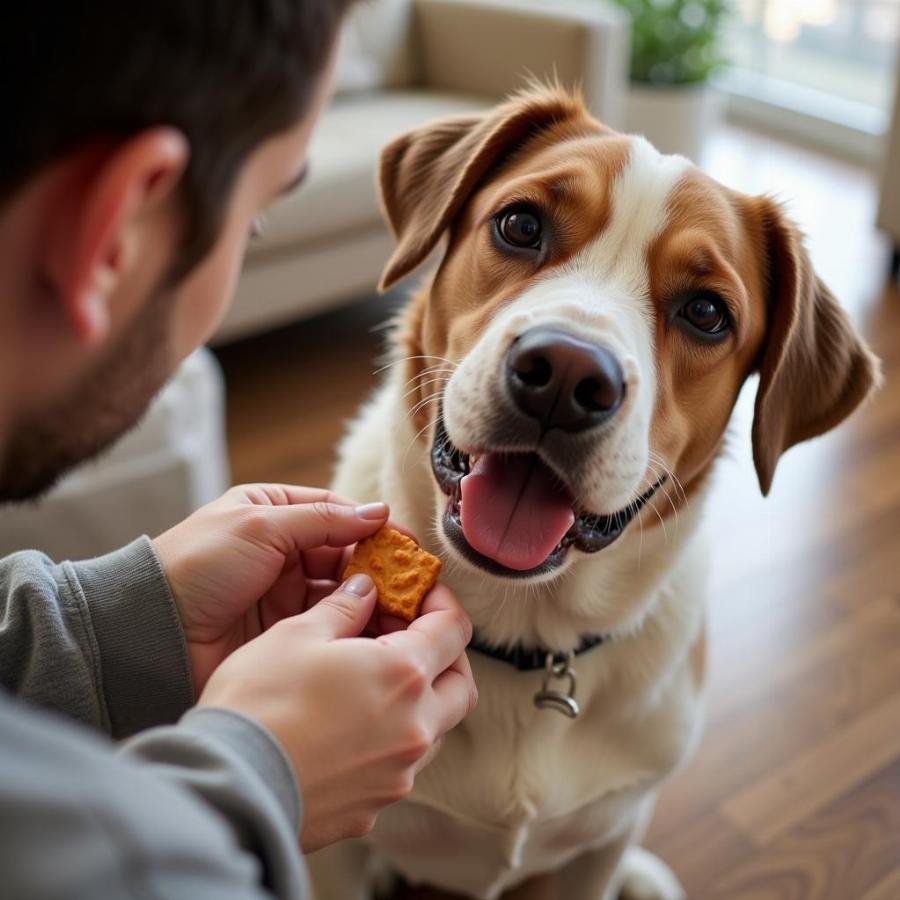If your dog ate a mouse, you’re likely experiencing a mix of emotions – disgust, concern, and maybe even a little curiosity. It’s a common scenario, especially for dogs with a strong prey drive. This article will guide you through everything you need to know when your dog eats a mouse, from potential health risks to preventative measures.
Should I Be Worried If My Dog Ate a Mouse?
Finding a half-eaten mouse in your backyard or, worse, witnessing your dog gobbling one down can be unsettling. While most instances of a dog eating a mouse are harmless, there are potential risks to consider. The primary concern is parasites and diseases that mice can carry, such as roundworms, tapeworms, leptospirosis, and hantavirus.
Common Parasites and Diseases
- Roundworms and Tapeworms: These intestinal parasites are common in rodents and can be transmitted to dogs through ingestion. Signs of infection include vomiting, diarrhea, weight loss, and a pot-bellied appearance.
- Leptospirosis: This bacterial infection can cause kidney and liver damage in dogs. Symptoms can range from mild fever and muscle aches to severe jaundice and kidney failure.
- Hantavirus: Although less common, hantavirus can be a serious concern. It’s transmitted through contact with rodent droppings or urine and can cause respiratory illness in both dogs and humans.
What Are the Symptoms to Watch Out For?
While many dogs show no ill effects after eating a mouse, it’s important to monitor your pet for any unusual signs. Look out for:
- Vomiting
- Diarrhea
- Lethargy
- Loss of Appetite
- Increased Thirst or Urination
- Abdominal Pain
- Changes in Behavior
My Dog Ate a Mouse: What Should I Do Now?
If your dog ate a mouse, the first step is to remain calm. Contact your veterinarian immediately. They will be able to advise you on the best course of action based on your dog’s breed, age, health history, and the prevalence of rodent-borne diseases in your area.
Veterinary Advice and Treatment
Your veterinarian may recommend bringing your dog in for a check-up, especially if they exhibit any symptoms. They might also suggest deworming medication as a preventative measure. In some cases, further testing might be necessary to rule out more serious infections. my dog ate a mouse
How to Prevent My Dog From Eating Mice?
Preventing your dog from eating mice involves a two-pronged approach: controlling the rodent population and managing your dog’s behavior.
- Rodent Control: Eliminate potential food sources for mice, such as spilled pet food or open garbage cans. Seal any cracks or holes in your home’s foundation that mice could use to enter. Consider using rodent traps or baits, but ensure they are placed out of your dog’s reach.
- Behavior Modification: Train your dog to “leave it” or “drop it” on command. This can be helpful in redirecting their attention away from mice or other unwanted items. Keep your dog on a leash during walks in areas where rodents are prevalent.
 Huấn luyện chó
Huấn luyện chó
Can My Dog Eat Minnie Mouse Toys?
This is a completely different concern! While the topic at hand is real mice, it’s important to note that any toy, including Minnie Mouse toys, can pose a choking hazard or cause intestinal blockage if swallowed, especially small parts. Always supervise your dog with toys and choose durable, appropriately sized options. minnie mouse dog minnie mouse dog costume
Conclusion
A dog eating a mouse is a fairly common occurrence. While not always cause for alarm, it’s important to be aware of the potential risks and take appropriate preventative measures. Monitoring your dog for symptoms and consulting your veterinarian are crucial steps in ensuring their well-being. By taking proactive steps, you can help keep your furry friend safe and healthy. disney dog collars
FAQ
- Is it normal for dogs to eat mice? Yes, especially for dogs with a strong prey drive.
- Can my dog get sick from eating a mouse? Yes, mice can carry parasites and diseases that can be transmitted to dogs.
- What should I do if my dog eats a dead mouse? Contact your veterinarian immediately.
- How can I prevent my dog from eating mice? Implement rodent control measures and train your dog to “leave it.”
- What are the signs of rodent-borne illness in dogs? Vomiting, diarrhea, lethargy, loss of appetite, increased thirst or urination, and abdominal pain.
- Can a single mouse kill my dog? Highly unlikely, but the diseases they carry can pose serious health risks if left untreated.
- Are there any home remedies for treating a dog who ate a mouse? No, always consult your veterinarian for professional advice and treatment.
Do you have other pet-related questions?
You might be interested in learning more about why dogs are often considered better pets than cats. Check out our article: why are dogs better then cats
Beaut Dogs: Your Trusted Source for Canine Information
Beaut Dogs is your one-stop shop for all things canine, offering expert advice and resources to help you navigate the world of dog ownership. From breed information to health tips and training guides, we’re here to support you every step of the way. When you need assistance, don’t hesitate to contact us via Email: [email protected] for detailed and accurate answers from our team at Beaut Dogs.